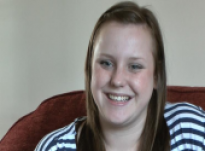Hannah

Hannah was invited to take part in a randomised clinical trial when attending the diabetes clinic for a routine appointment. After everything had been explained and reading the information she was given Hannah agreed to take part.
Hannah is 17 years of age, is White British, goes to a local high school, and lives at home with her parents. Hannah was diagnosed with diabetes at the age of four years.
More about me...
Hannah is 17 years of age, is White British, lives at home with her parents, and attends a local high school. Hannah was diagnosed with diabetes at the age of four years. When attending the hospital diabetes clinic for a routine appointment Hannah was approached by a research nurse who asked if she would be willing to take part in a randomised controlled trial. Hannah can’t remember the exact purpose of the study but says they were comparing different ways of giving diabetes information to young people with diabetes. Her parents also had to complete a questionnaire.
Hannah had lots of information to take home and read, so she had time to make a decision and to ask any questions. Hannah signed a consent form to say she was happy to take part. Hannah was in the control group and continues to receive information in the usual way. She explains that being in control group meant that the researchers compare her questionnaire (along with the questionnaires of other young people in the control group) with the questionnaires of young people who received the new ways of having information. Hannah completed two questionnaires. Although the questionnaire was quite lengthy; approximately 30-40 pages, the questions were easy to understand with tick boxes and took about 20 minutes to complete. Questions focused on her diabetes in general, how long she had had diabetes and the types of information she had received. Although Hannah could have taken the questionnaires home to complete, she preferred to complete them while waiting for the doctor at her routine clinic appointments.
Hannah didn’t mind being in the control group and was happy to take part and help the researchers. However, she adds that it would have been nice to know what the other ways of giving information were to understand better what she was being a control for. Hannah would like to know the results of the trial and thinks it is important this is fed back to young people.
Being able to ask questions reassured Hannah why she was being asked to take part.
Being able to ask questions reassured Hannah why she was being asked to take part.
Giving consent to take part in a trial made Hannah feel she was being responsible for her own health, but it is important to understand what you are signing for.
Giving consent to take part in a trial made Hannah feel she was being responsible for her own health, but it is important to understand what you are signing for.
Being randomised makes it a fair chance of being in either trial group. Hannah was happy to be in the control group, but she would like to know what the new way of giving information is.
Being randomised makes it a fair chance of being in either trial group. Hannah was happy to be in the control group, but she would like to know what the new way of giving information is.
Hannah would often discuss things in the questionnaire with her parents; and sometimes they compared notes.
Hannah would often discuss things in the questionnaire with her parents; and sometimes they compared notes.
Taking part in the trial was a 'wake-up' call for Hannah, and a realisation of how little she knew about diabetes. She is now more confident to ask questions and take steps to improve her health.
Taking part in the trial was a 'wake-up' call for Hannah, and a realisation of how little she knew about diabetes. She is now more confident to ask questions and take steps to improve her health.
Hannah would like to have had more opportunities during the trial for group sessions with diabetic nurses and doctors to improve her understanding of diabetes.
Hannah would like to have had more opportunities during the trial for group sessions with diabetic nurses and doctors to improve her understanding of diabetes.
I would say maybe like a course of some sort. Just, maybe just a few one-hour sessions just to like make my understanding of diabetes a lot greater than it is. So maybe just a few, not necessarily so formal, maybe a bit more relaxed like a, just like everybody talking about it, and, and a doctor or a nurse or someone just explaining how insulin works or how your body works or reacts to it or… just something so you get a bit more of a understanding.
Hannah would consider taking part in another trial. She feels there is little known about diabetes and anything to help advance knowledge is a good thing.
Hannah would consider taking part in another trial. She feels there is little known about diabetes and anything to help advance knowledge is a good thing.

